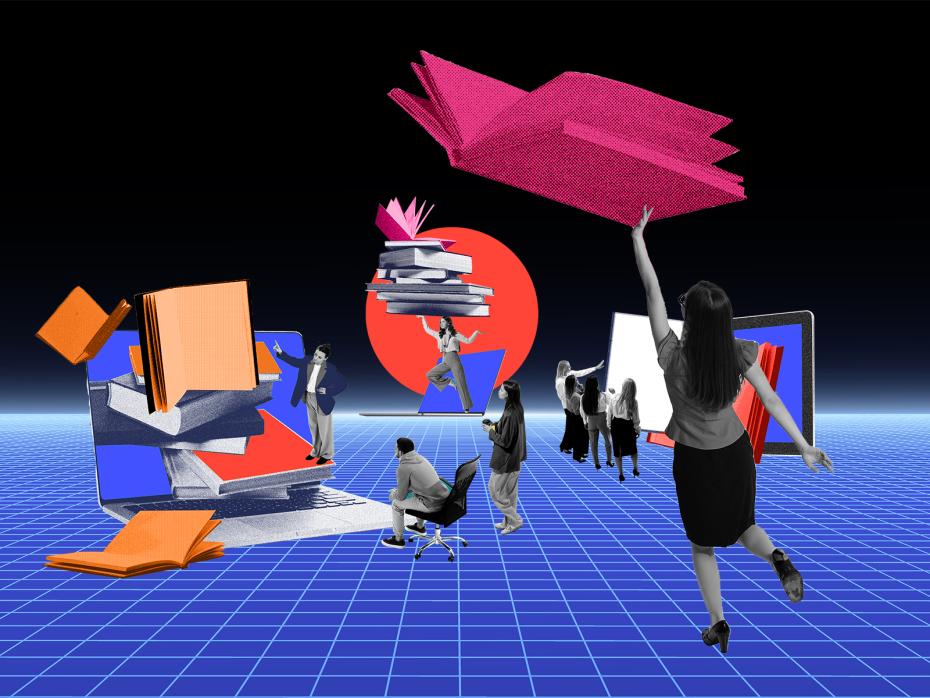Information literacy encompasses the knowledge, skills and mindsets that guide learners and scholars to engage with information productively. It has become even more pertinent in an AI environment, where information users need to actively exercise reflective thinking, steering AI tools without overdependence. Here, we’ll highlight key areas where librarians can support students in developing their information literacy skills to interact effectively with AI tools.
Understanding information literacy
The ACRL Information Literacy Framework defines information literacy as “the set of integrated abilities encompassing the reflective discovery of information, the understanding of how information is produced and valued, and the use of information in creating new knowledge and participating ethically in communities of learning.”
- ‘Many academic librarians are now effectively digital curators’
- Campus talks: how the university library is an agent of change
- Is AI literacy an information skill?
In our increasingly AI-enhanced information environment, the emphasis on “reflective” thinking is paramount. Metacognitive skills are important when we collaborate with AI. While AI tools assist us when we engage with information, we are the ones who consciously decide where and how to find information, what to use and how to use them. Librarians can play a important role in fostering the metacognitive skills that enable students to collaborate with AI tools effectively.
The ACRL framework outlines six frames of information literacy:
- Research as inquiry: Research is iterative and driven by evolving questions.
- Searching as strategic exploration: Searching is non-linear and iterative.
- Authority is constructed and contextual: Authority depends on both the information need and context.
- Scholarship as conversation: Research is a dialogue across time and disciplines.
- Information creation as a process: Writing is iterative and shaped by purpose and audience.
- Information has value: Ethical use and attribution are central to scholarship.
A key theme in the framework is the iterative nature of information journeys. This awareness is especially important when students use AI tools. Understanding how information and knowledge is created, preserved, disseminated and used remains relevant, regardless of technological advancements.
Reflective information journeys and librarians’ support
To illustrate how librarians can assist students to engage with information, let us consider the example of an undergraduate working on a term paper. We will explore the stages of her information journey, highlighting reflective points and the support librarians can offer:
1. Brainstorming and research question development
The student begins by using an AI chatbot to gain an overview of the topic, generate keyword suggestions, refine the research question and clarify key concepts. In the process, the student must actively relate the chatbot’s suggestions to her course material. She also needs to recognise when to verify key concepts and definitions using credible sources.
Librarians can help the student by teaching them how to effectively collaborate with AI chatbots for brainstorming while emphasising the importance of critical evaluation. Hands-on workshops can guide the brainstorming process while encouraging them to reflect on their prior knowledge and course content. This reflective practice is crucial for refining research questions based on their understanding of the topic.
2. Searching strategically and evaluating authority
Using insights from the chatbot session, the student searches for articles in databases, AI-powered research tools such as Scite and Elicit, and citation mapping tools like Research Rabbit, observing how search results change when she applies different search strategies. In evaluating sources, she considers a mix of scholarly and non-scholarly materials, using her own judgement based on criteria such as authorship, source type and the academic level appropriate for her undergraduate course project. If her searches do not return a fruitful set of sources, she must be prepared to return to the previous stage and reconsider her research question.
In this complex stage, traditional information literacy instruction on effective search strategies and the importance of evaluating sources remains vital. Additionally, librarians can introduce relevant AI tools to help students uncover sources beyond simple keyword matching. With content generated by or filtered through AI tools, evaluating sources and verifying authority and credibility becomes even more crucial. Librarians can guide students to ask critical questions when using AI-generated summaries and encourage them to reflect on how the information relates to their purpose and research question, cultivating a more discerning mindset for information consumption.
3. Synthesising findings
The student organises her selected sources in a reference management tool and uses AI summarisation tools to extract key points. She creates comparison tables to identify patterns, contradictions and gaps across the literature. Through this comparison, she might notice emerging themes and how different disciplines approach her topic. She must consciously decide how to connect her arguments in the term paper with the literature and remain aware of biases in AI-generated summaries that could amplify dominant voices and under-represent marginalised views. She might also need to search for additional sources to fill any gaps identified.
Librarians can assist at this stage by teaching students how to use reference management tools and AI tools effectively. Numerous AI tools can help students extract key points across sources and create visual aids, such as comparison tables or concept maps, to identify patterns, contradictions and gaps in the literature.
As students synthesise their findings, librarians can facilitate discussions about the diverse perspectives presented in the literature. By encouraging students to explore how different disciplines approach topics, librarians can help them recognise the value of interdisciplinary dialogue. Emphasising potential biases in AI-generated summaries can prompt students to seek out under-represented voices, reinforcing the idea that scholarship is a conversation that includes multiple viewpoints.
4. Writing and proper attribution
The student writes her paper by outlining her main arguments and matching them with supporting evidence. In this stage, AI tools can help to improve the language usage but the student should actively decide how to use it to assist her writing. For example, she might learn to first formulate her own argument and ground it in the sources she has found, draft the paper herself and then use AI to provide comments and enhance the writing.
Here, librarians can provide guidance on ethical scholarship, including proper citation practices and the importance of transparency in using AI tools. They can emphasise the iterative nature of academic inquiry and scholarship creation, encouraging students to shape their work with intention and clarity, consciously aware of how they formulate and communicate their ideas.
Reminders for librarians
Librarians have decades of experience in supporting students’ information literacy. As AI tools change the ways students interact with information, they must sharpen the focus in enhancing reflective decision-making in students’ information journeys. To enable that new focus, they should:
- Stay updated on AI tools: librarians should remain informed about the latest AI tools, their strengths and weaknesses, and how they apply in information engagement. They can then introduce proper tools to students for different information purposes and guide them how to use them effectively, responsibly and reflectively.
- Teach students what to delegate to AI and what not to: this goes hand in hand with the awareness of which tools to use. Librarians can help students recognise the specific problems they want to tackle before choosing the tools; guide them to make a delegation plan regarding how and when to use AI in their information inquiry.
- Emphasise the iterative nature of information search: Librarians can help students understand that engaging with information is not linear. This is crucial in an AI environment where students might rely on technology for quick answers.
- Reinforce the core information literacy concepts: the foundational knowledge on information and academic discourse remains relevant. For example, understanding the distinctions between research journals and encyclopedias is crucial for students when they make decisions in their information journeys. Librarians should emphasise core information literacy concepts alongside their new focus on AI tools.
In an AI-enabled learning environment, information literacy becomes even more important for students in their academic pursuits. By emphasising reflective decision-making, the iterative nature of information inquiry, the importance of critical evaluation and the ethical use of information, librarians empower students to navigate an AI-assisted academic environment with confidence.
Aster Zhao, Samson Choi and Gabi Wong are librarians at Hong Kong University of Science and Technology.
If you’d like advice and insight from academics and university staff delivered direct to your inbox each week, sign up for the Campus newsletter.




comment